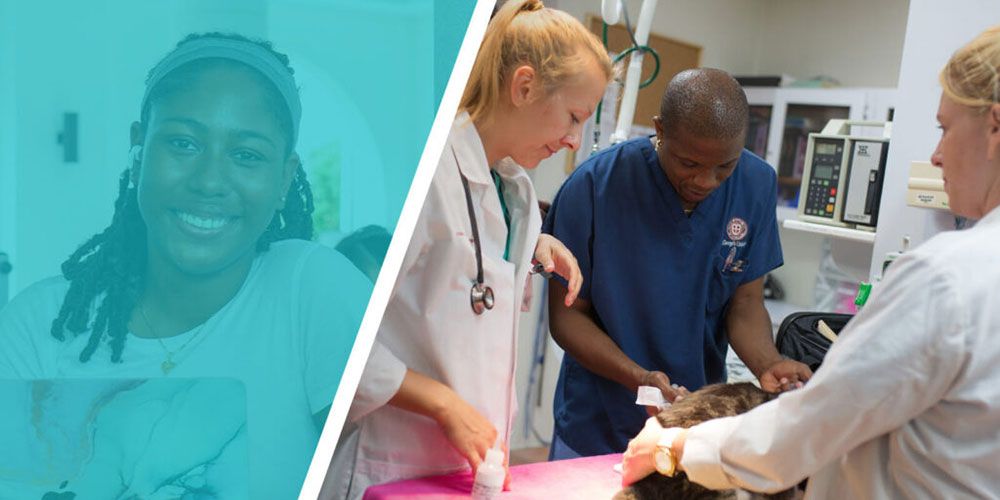The process of becoming a veterinarian can be as rigorous as it is rewarding. And no matter how certain you are that this pursuit is your calling, you may still be wondering, “What is vet school like?”
A typical veterinary student’s day will vary depending on the program they attend and also their study habits . However, you can learn a lot about what to expect in vet school by hearing from someone who’s been through it.
We spoke with Dr. Sarah Schott, associate veterinarian at Green Meadow Veterinary Hospital and St. George’s University (SGU) graduate. She gave us the inside scoop on the veterinary student experience and an in-depth look at a day in the life of a vet student.
What is vet school like? One DVM shares her experience
The first thing to understand about vet school is that your schedule will evolve as you progress through your Doctor of Veterinary Medicine (DVM) program. However, Dr. Schott provides the following outline for a typical first-year veterinary student.
Start your day thoughtfully
Veterinary school is an all-day affair, so Dr. Schott and her peers found it useful to give themselves plenty of time in the morning to get ready. She’d typically wake up between 6:30 and 7:00 am most mornings—a schedule she stuck to pretty diligently.
“Veterinary school is pretty tolling, so you have to have a schedule,” Dr. Schott advises. “And eat a good breakfast. You’re going to be sitting in class all day, and you need something substantial so you can pay attention.”
Head to your morning classes
School usually starts pretty early and can last until the evening. In fact, veterinary students’ school days tend to last a bit longer than the standard workday many people are accustomed to. “A typical day was 8:00 am to 5:00 pm,” Dr. Schott notes.
You’ll either go directly to class for morning lectures or to one of your labs—it depends on the term. “Let’s say you go to class first,” she explains. “We would have four lectures, but we’d get a 10- or 15-minute break between each one.”

Though every school’s curriculum is slightly different, there are a few courses every vet student should expect to encounter during their first year.
“Anatomy and physiology are probably your two most prominent classes,” Dr. Schott says, adding that anatomy is particularly important since it involves a lot of lab work.
Take advantage of your lunch break
When veterinary students wrap up their morning session, it’s time to take a break to refuel. You might also have some time to study before heading to your afternoon class or labs. Dr. Schotts notes that fitting in some extra time to review your coursework is always a good idea, as many programs will administer regular quizzes to assess your understanding of the material in addition to your regularly scheduled midterms and finals.
You may also be able to use this downtime to attend events for on-campus clubs or organizations. “Sometimes they have lunch lectures,” Dr. Schott says. “A club will have a special lecturer who will … talk about a certain topic.” Taking advantage of these supplemental opportunities for learning can be smart, as veterinary medicine is a complex and evolving field, and you’ll want to remain focused on continually growing your skill set.
Head to extracurriculars or hit the books
When your afternoon break ends, you’ll finish your day of courses. If you attended lectures in the morning, for example, your afternoon at SGU will be spent in labs where you’ll get to focus on gaining hands-on experience. Vet students will typically finish with classes or labs right around 5:00 pm, but that doesn’t mean the day is over.

Evening is when study groups and different clubs meet, and a lot of students find these opportunities to be invaluable. “I got really involved,” Dr. Schotts reminisces. “I was in the Student Government Association, and I was in the Large Animal Society.”
Aside from enjoying these unique opportunities to pursue your interests, on-campus organizations also provide some ways to advance your education. “The more clubs you join, the more experience you gain,” Dr. Schotts says, explaining that it’s not uncommon for these student groups to focus on lab work and other important aspects of veterinary medicine.
If you’re not headed to a club or organization meeting, it’s likely you’ll be spending your evenings reviewing class material. Studying with groups is a great way to break up the monotony of solo studying. You might even learn some new study strategies that prove helpful throughout the duration of your veterinary student experience.
Dr. Schott found study groups led by upperclassmen to be particularly useful. “I did a lot of those my first year. That helped me develop ways to study and figure out how I needed to learn.”
Prioritize self-care
Even the most diligent student needs to take a break, so make sure you allow yourself to have fun while in veterinary school. Dr. Schott recommends taking a night off every now and then. By participating in activities that have nothing to do with vet school, you able to avoid burnout. She participated in intramural volleyball, went to the beach on the weekend, and went out to dinner with friends regularly.
“You have to reserve some time that’s not spent thinking about school. I think that’s important because if you’re constantly doing the same thing, you’re not going to get anywhere,” Dr. Schotts offers.

Building relationships with your fellow classmates can also be helpful as you progress through veterinary school. You’ll likely make fast friends since you all have similar interests and are going through the same experiences as vet students. And you may be surprised how your professional lives intertwine later on. “They could be your colleagues in the future,” Dr. Schotts points out.
Prepare for success in vet school
So, what is vet school like? Not only will you be expected to absorb a lot of new material, but you’ll also need to develop the practical skills that prepare you to be successful after graduation.
Becoming a veterinarian is going to take hard work. “You have to make a lot of sacrifices with what you want to do during vet school because it’s very time-consuming,” Dr. Schotts says. “But it’s worth it if this is what you want to do.”
Now that you know more about what to expect in vet school, you may be ready to start seriously evaluating your options. Find out what you should be looking for in our article “6 Things the Top Veterinary Schools Have in Common.”
*This article was originally published in April 2022. It has since been updated to include information relevant to 2024.

